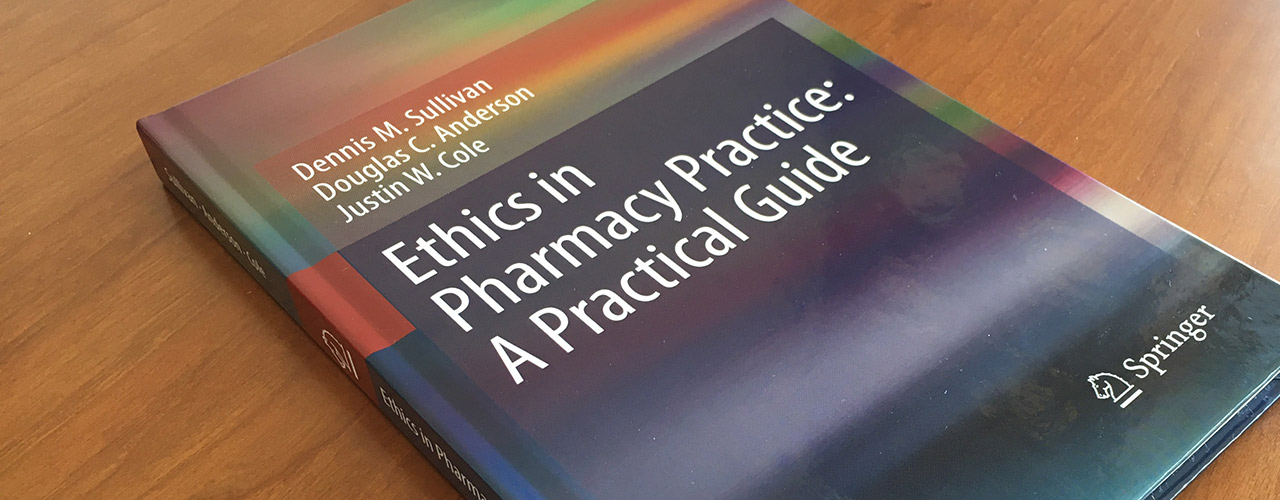by Bryson Durst, Student Public Relations Writer
Pharmacists now have increased opportunities and responsibilities beyond dispensing drugs, which means they also have new ethical challenges to consider.
To help pharmacists develop a firm ethical foundation for their practices, three Cedarville pharmacy professors recently wrote “Ethics in Pharmacy Practice: A Practical Guide,” released by Springer Nature Group earlier this year.
The textbook was written by Dr. Dennis Sullivan, professor emeritus of pharmacy practice; Dr. Justin Cole, associate professor and chair of pharmacy practice and director of the center for pharmacy innovation at Cedarville; and Dr. Douglas Anderson, previous faculty member of the school of pharmacy.
The new textbook starts by addressing the foundations for pharmacy ethics. This section includes discussions on human value and how a faith perspective influences ethical views.
The textbook also discusses specific ethical issues in pharmacy practice today. These issues include reproduction, abortion, end-of-life treatments, euthanasia, conscience rights for pharmacists, vaccines, and unproven medical treatments. Case studies further explore these issues, with the authors providing analysis on some and leaving others open for classroom discussion.
“I want them to look at the arguments from multiple sides,” Sullivan said. “Based on their study, critical thinking, and faith, I want them to arrive at their own conclusions because they’re going to hold on to those ethics positions a lot longer if they are taught how to process ethical issues.”
The book ends with a look at gene editing and other potential challenges for the future.
“Today’s students will encounter new things that I will not in my career,” Cole said. “We need to help them have a strong ethical framework and foundation.”
The textbook was designed as a resource for all practicing pharmacists and pharmacy students across the country. Thus, it is written with a primary focus on normative ethics, which focuses on what action a person should take in a given situation. “We believe our students will arrive at the best conclusion if they study the foundations well. The answers should become clear if they’re well-trained in ethics,” Sullivan said.
While the textbook is not explicitly faith-based, the authors wanted to show the value of a faith perspective in discussing and forming ethical positions. A faith-based perspective is especially important because, according to Sullivan, 80% of patients have a faith that impacts their ethics and decisions.
The new book comes at a time when pharmacists have increased opportunities and responsibilities beyond dispensing drugs. The state of Ohio now allows pharmacists to engage in collaborative practice agreements, where physicians can refer a patient to a pharmacist to help them manage their diseases.
“We’re training pharmacists to impact patient care well beyond providing a product,” Cole said. “They are being equipped with skills for disease state management and therapeutic drug monitoring.”
COVID-19 has also expanded the role of pharmacists, allowing them to offer vaccines to more age groups, administer tests and provide treatments like monoclonal antibodies.
“Ethics in Pharmacy Practice: A Practical Guide” is available directly from Springer, as well as Amazon and other bookstores.
Located in southwest Ohio, Cedarville University is an accredited, Christ-centered, Baptist institution with an enrollment of 4,715 undergraduate, graduate, and online students in more than 150 areas of study. Founded in 1887, Cedarville is one of the largest private universities in Ohio, recognized nationally for its authentic Christian community, rigorous academic programs, including the Doctor of Pharmacy program, strong graduation and retention rates, accredited professional and health science offerings, and high student engagement ranking. For more information about the University, visit cedarville.edu.



















